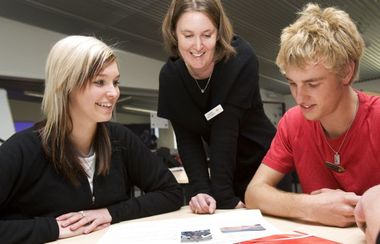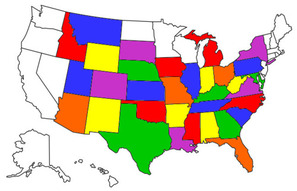 My mom is a teacher. My aunts and uncles are teachers. I married a teacher, and then I became one myself. I also have two children in public schools, and as they enter their high school years, I am even more thankful for the contribution teachers make daily to the lives of children. Almost without exception, every teacher I know believes his or her job is a higher calling. They take seriously their mission to prepare their students for whatever comes next, whether it’s first grade or the first year of college. The teacher’s job is not an easy one, but it is a very important one. It is not, however, the most important influence in a child’s life. Without a doubt, teachers play a critical role in the education and development of young people. However, parents are their children’s first and most influential teachers—for better or for worse. The lessons learned in the first few years of life can determine a child’s success in school, whether that school is public, private, or conducted at home. The lessons learned in childhood and adolescence can determine whether that child matures into an adult who contributes positively to the world or one who asks that the world contribute to him or her instead. Study after study has found that home factors, including parental literacy, a dependable and trustworthy support system, physical health, and appropriate relationships and role models, have as much to do with student success as anything that happens in the classroom. Parents are their child’s first teacher, and the lessons imparted by parents stick with their kids for many, many years, says Meredith McClendon, a certified parent educator with the Parents as Teachers affiliate in Talladega, Ala. McClendon says that because parents have tremendous influence even before a child is born, parental engagement is critical from the very beginning. Though engagement certainly includes activities like reading and talking to a child, it encompasses so much more. Every experience, whether kicking a soccer ball or folding washcloths, teaches a child. Every task a child accomplishes gives him or her a little more confidence for the next task. That’s the key problem with so-called helicopter parents, those who protect and help so much that their children don’t learn for themselves. But what about those young people who have to learn so much independently? Those whose families struggle to put food on the table and gas in the car? Most of their parents desire a better future for them, but it’s hard to be engaged at school when you work 8-5 at a manufacturing plant. Teachers seldom have free time in the morning, and few want to hang around hours after the school bell rings. The parents may be trying their best, as are the teachers, but there’s another piece of the puzzle that can perhaps mean the difference between success and failure—the family of faith. Just as studies have shown that home factors play a tremendous role in student success, community resources like caring neighbors, creative opportunities, and religious participation have also proven influential. Church programs like after-school tutoring or literacy missions are one way to reach students and their families. But even Sunday School teachers, pastors, and other caring adults in a congregation can provide an additional avenue of encouragement and support that struggling students need. Think back to when you were young. Who was that encourager whose kind words motivated you to do better? Will you ever forget their kind words, their belief in your ability to achieve your goals? We all have within us the power to be that person in a young life. As believers in Jesus, we have the ultimate encourager on our side. Time and time again, God sends a word to His people: Do not fear. That’s the message young people in our church, whether their parents come with them or not, need to hear from us. Fear is a powerful motivator, and most of us, if we’re honest, struggle to fight our fears. Our children may have different fears, but they too struggle to see the brighter outcome. For students who come from difficult family circumstances, fear may not be confessed, but it is certainly present. The PBS NewsHour featured a special weeklong series last week Monday called “Rethinking College.” In the first installment, NewsHour reporter Hari Sreenivasan interviewed two students from low-income homes. Both expressed their fears of college. (Hint: They weren’t about passing tests.) Here’s what one said: “Being able to confidently walk around campus knowing what I want to do, being able to just talk to a professor and ask them for something. I think that is super scary.” Another student said this: “You just sometimes feel like you are not adequate. And I think it’s really important to tell you that you are adequate. You do have all the skills that everyone else does. You just have to believe in yourself.” We need to teach our children and our “church children” that they are more than adequate, not because of anything they have done or will ever do, but because God created them in His image and because Jesus died for their sins. We must teach them to trust Jesus first and regularly reinforce to them that their identity is in Him—regardless of academic, social, athletic, or professional success. As Paul writes “as we have opportunity, let us do good to all people, especially to those who belong to the family of believers” (Galatians 6:10). This goes for everyone in our family of faith—adults, teens, and children alike. Teachers can tell their students they are adequate and prepare them with the skills they need. But those words carry more weight when they come from a parent. They carry lasting weight when they know the one who speaks them is speaking in love. The good news is that it’s never too early or late to begin. If you are the parent of a child in school, get involved now. Before you drop your children off at school every day, pray for them. Pray with them. If you can, volunteer at their school or have lunch with them a couple of times during the year. Join the PTO. Pin up what your child brings home from school. Let your child know that you believe education is important, but more importantly, let your child know you believe he or she is important. More importantly, teach your child that God has placed a “holy calling” on their lives. They may be carpenters, doctors, palaeontologists, or architects, but God has placed that desire in their hearts, and He will use their work for His glory. That’s my prayer for my children…. Won’t you join me in praying that for your children as well?  My son could not wait until the first day of school. He didn't care what clothes he wore or how he would get there. For him, the first day of this school year was just like the last day of last year--another day to hang out with his friends. I never had that kind of enthusiasm for first days. The transition from elementary to high school was painful. I arrived at a new school with no old friends. For an extremely shy and anxious kid, that school year loomed long and lonely. Starting college six years later, I went through the dreaded first days again. Most freshman gain weight when they get to college. I, on the other hand, lost 15 pounds because not even McDonald's finest fries could slip through the lump in my throat that first semester. Even now, I can't think of those days without deep, deep sadness. So when my sweet girl burst into tears as soon as the car door closed yesterday, lots of emotions starting churning inside this momma who knows all too well how hard it can be to begin again alone. The timing of the summer movie "Inside Out" couldn't have been better for the two of us. While we didn't move, my daughter's best friend did. So yesterday, as teacher after teacher called out her friend's name, my girl was reminded over and over that someone special was missing whose very presence could have made this day just a little brighter. Sadness certainly sat at the controls yesterday. I'm glad to see all the reports of great first days yesterday--really, I am. I don't wish any child the pain of spending a day on the verge of tears because they feel so alone they want to disappear for real (you know, because they're already invisible). But her day was anything but great, and today may not be any better. It's not all bad news though. She is strong and courageous, and she headed out the door today with an attitude that quietly insisted "let's get this done." Will be it be a "great" day? Probably not. Will she get through it? Absolutely. Today. Next week. First semester. The whole year. She will survive and thrive because she knows who she is and Whose she is, regardless of the circumstances. Change is inevitable. Transitions are part of life. They stretch us. They show us what we're made of. We feel their pain, and ultimately, we realize their gain. This morning, as I always do, I encouraged both my kids to notice those around them. Though my daughter didn't really believe it, someone in her class is probably hurting more than she is. In the hall, in band, in the lunchroom, or on the bus, there is someone who needs a smile and a kind word. I regularly tell my kids that I would much rather they be remembered for their kindness to others than for any academic or extracurricular accolades. Coming from someone who long thought her only value was in what she could achieve, I hope that message sticks with them. If you're reading this and have influence over a child, I hope you will share that message with them as well. When Joy is at the wheel, share that with someone who is overwhelmed with Sadness. They may not be able to tell you thanks, but it will make all the difference.  Have you heard that Kim Kardashian has written a book? Perhaps written is not the best word. Though she's the author of the current best-selling celebrity photography book on Amazon, the book is not one of words. It's of pictures. Hundreds of selfies the celebrity has taken of herself through the years. The title of the book is Selfish, which seems pretty fitting. Questions about what makes people want to take photos of themselves constantly aside, Kardashian has certainly made a career out of her physical appearance and look-at-me lifestyle. It's a choice and a direction that I daily seek to guard against. As a parent, one of my ultimate measures of success will be the selflessness my children show. Will they put others before themselves? Will they seek the greater good for their families, their communities, their churches? Will they be servant leaders, as Jesus calls his followers to be. I pray they will. But it will not be easy. Kids today have more technology in their pockets than my parents had in the entire household when I was 13. Some of it is great, but most of it is really frightening. And I say frightening because it has power. It has the power to control our minds. We check the phone frequently for new texts, Facebook posts or tweets. It has the power to control our free time. Instead of reaching for book or magazine, the smartphone is what we pick up when we have an unoccupied moment. And it has the power to control our hearts. Social media especially can make us question our likes, our dislikes, our wants and our needs like nothing else has ever done. So when I recently wrote about social media and its dangers for The Alabama Baptist, I had a lot of questions. Certainly we didn't cover everything, but there's some great advice for parents and caregivers on how to guard yourself and your family from the dangers of social media. I also recommend a book by Alabama youth minister Tommy McGregor. Selfie: A Parent's Guide to Social Media (also available on Amazon) provides an excellent overview of how parents can help their kids successfully navigate the digital world they live in. It also helps parents recognize the boundaries that we must have for ourselves and our children. Check out Tommy's book, and these articles at The Alabama Baptist. Faith and Family: How social media is hurting families — Parents must talk about social media safe practices early, often as it is an ever-changing technology I would love to hear how you're navigating the waters of the social media ocean as well. I know we're pressing on together, so my prayers are with you all in the journey.  A few years ago, my husband decided we should buy a camper. I wasn't entirely thrilled with the idea. To make a long story, short: he shopped, we bought a used camper, the babies jangled the metal window blinds every night we spent in it, we traded the first camper for a newer model with cloth window shades, and I have been sold out on the joys of camping ever since. Camping introduced many new loves to me (more about those in other posts), and our "hotel room on wheels" opened the door to a family goal. We would visit 48 states prior to our oldest child's high school graduation and reward high school graduations with trips to Alaska and Hawaii. It has been a terrific goal. We've been to 33 states so far and have a very cool map on our camper to track our adventures (much like the one posted here). But since our children have reached their 'tween years, a fog has settled in over our field of dreams. The goalpost is harder to see. Activities, finances, and responsibilities are making it harder to plan our next road trip. I'm unhappy about that. I want to look at some maps, book a few nights at a campground, and make some plans. Our summer road trips have provided some great memories and long, uninterrupted family time--time I crave to spend with my husband and children, seeing the beauty and diversity of God's creation. It makes me incredibly sad to think we may not reach our goal to "See All 50." King Solomon knew the desire to make plans as well. Failing to plan, he warns, leads to "poverty" (Proverbs 6:11), but "the plans of the diligent lead to profit” (Proverbs 21:5). In his heart, Solomon also knew the truth about planning that we often overlook: “In his heart a man plans his course, but the LORD determines his steps” (Proverbs 16:9). Lately it seems most of my steps are concealed in the fog. My heart wants answers to the big picture, long-term, lasting impact kinds of questions--answers that just aren't there. So I press on, even though the goalpost seems to keep moving, trusting that God's will for my life is better than any plan I can imagine. I pray to love His desires for my family and for me more than my own. And I pray that in the meantime, I will make more of each precious moment I am privileged to spend with the people I love because in the end, if I don't have love, I have nothing at all. Author's Note: "Hands Free Mama" Rachel Macy Stafford offers some great encouragement for busy parents. Visit her website at www.handsfreemama.com. (This article first appeared in The Alabama Baptist newspaper. Click here for the original article.)  When my daughter was 3, our babysitter decided to return to her corporate job, leaving us with 2 weeks to find a new sitter. God quickly opened the door to a new sitter where my daughter made friends who would be with her all the years of elementary school. Working parents face tough decisions when it comes to child care. Grandparents or other relatives often help out. Daycare is another option. However, even when kids start school, parents are not freed from the childcare dilemma, often seeking quality care for the time before or after school. To meet this growing need for afterschool care, many Alabama Baptist churches are opening their doors to students and providing a much-needed ministry to their communities. But in many communities, there are no few if any good options for kids and their parents. What has been your most significant daycare dilemma? Was it while your kids were preschool aged or have the challenges increased as they've gotten older? Has your church or another church in your community helped your family? I would love to hear your story. |
About MeI am a regular contributor to The Alabama Baptist newspaper, and I also write and edit for several religious, business and educational outlets through my business, McWhorter Media and Marketing.
One of the greatest privileges of being a writer is the opportunity to share the stories of others with a larger audience. I love to do that! Sharing my own stories is much more challenging, though no less important to making sense of the challenges of Faith and Family in everyday life. Thanks for joining me on this journey! Please feel free to contact me if you have questions or suggestions. Contact Carrie If you would like to receive new posts, I invite you to follow me on Twitter @CarrieMcWhorter or use the contact form to send me a newsletter request. Archives
March 2017
Others I'm following...Categories
All
|
